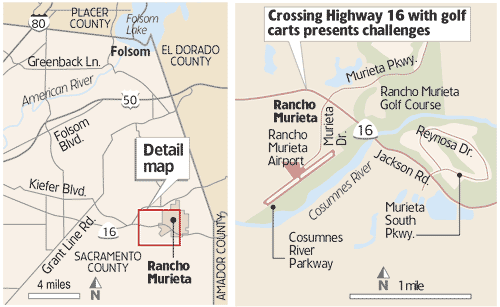Putting along: Rancho Murieta fights for golf cart lifestyle
By Sandy Louey -- Bee Staff Writer
Published 2:15 am PDT Monday, October 17, 2005
Story appeared in Metro section, Page B1
http://www.sacbee.com/content/politics/local_government/story/13727951p-14570854c.html

A Rancho Murieta resident drives across Highway 16 in her
golf cart last week. The community must come up with a
transportation plan to legally allow such trips.
Sacramento Bee/Josť Luis Villegas
All Rancho Murieta residents want to do is cross Highway 16. All
the state wants to do is make sure they don't get hurt doing so.
That's where the golf cart meets the road.
For 30 years, residents in this golfing community in eastern
Sacramento County have puttered across Highway 16 in electric
vehicles that are as plentiful here as seven irons.
Then, three years ago, the California Highway Patrol told
them the trips were illegal.
 With a few exceptions, state law prohibits golf carts from
traveling on most public roads. Other low-speed vehicles, known
as neighborhood electric vehicles, go faster and are allowed on
streets with a speed limit of 35 mph or less. Neither is
permitted to cross a road with a 45 mph or higher speed limit.
With a few exceptions, state law prohibits golf carts from
traveling on most public roads. Other low-speed vehicles, known
as neighborhood electric vehicles, go faster and are allowed on
streets with a speed limit of 35 mph or less. Neither is
permitted to cross a road with a 45 mph or higher speed limit.
Highway 16, also known as Jackson Road, has a 55 mph speed
limit, meaning those piloting golf carts faced a hefty $300 fine
each time they meandered across it.
Special legislation passed giving the potential lawbreakers
an exemption. But there was a hitch that Rancho Murieta
officials only recently discovered. Now residents must come up
with a golf cart transportation plan they hope will allow
low-speed electric vehicles to legally amble across the highway.
Rolling through streets in an electric vehicle makes perfect
sense for residents in self-contained communities such as Rancho
Murieta. The gated community has about 6,000 residents - and at
least 1,200 golf carts and other electric vehicles, said Ed
Crouse, general manager for the Rancho Murieta Community
Services District.
Yellow cart crossing signs are everywhere. Moms drop off
their kids at the bus stop in their golf carts. Kids hop in and
out of them to go trick-or-treating. Owners decorate them for
Fourth of July and Christmas parades..
"I thought they were fairly hilarious," said Karen Muldoon,
who bought a cream-colored cart after moving to Rancho Murieta
seven years ago.
Muldoon runs RanchoMurieta.com, a community Web site that has
monitored the issue of golf carts and Highway 16.
During warm months, Nancy Ruff hops into her
champagne-colored cart several times a week to run errands
across the highway at Plaza Foods and the post office. She even
uses it to take her dog, Mutley, to his veterinarian
appointments.
"It's absolutely pleasant," said Ruff, who has lived in
Rancho Murieta for two years. "It's a wonderful thing to have."
Golf carts start at about $5,300 and can run as high as
$14,000, said a sales representative with Roseville-based
Electric Golf Car Co. Inc.
Del Webb, the builder of retirement communities, is big on
electric vehicles. Many of the company's developments are built
around golf courses - a 2,600-home community with a golf course
is on the drawing board for Galt - so it's not uncommon to find
homeowners tooling around in their carts. "People love it
because it's cheap to operate," said Judy Bennett, Del Webb
spokeswoman.
In Sun City Lincoln Hills, a Del Webb development in Placer
County, residents can cruise on designated golf cart paths to
nearby shopping centers. Lincoln officials are developing a golf
cart transportation plan that could allow them to go elsewhere
in the city.
Rancho Murieta residents thought their problems were solved
in 2003, when a law passed permitting carts to cross the highway
at Murieta Drive and Murieta South Parkway. They were surprised
earlier this year when they discovered a golf cart
transportation plan was required to make the crossings
permanent.
"It slipped through the cracks," Crouse said.
State law says cities or counties that want to allow golf
carts on city streets must adopt a plan spelling out where carts
can cross and travel and what special lanes, signs or equipment
may be needed.
The plans can be very detailed. In Palm Desert, which has had
a golf cart transportation program since the early 1990s, owners
who drive on city streets are required to obtain a permit every
two years and provide proof of liability insurance. And their
carts are inspected to make sure they're equipped with seat
belts, brakes, headlights, rear lights, windshield, horn and a
covered passenger compartment.
According to the CHP, there has been only one golf
cart-related accident in Rancho Murieta in each of the past two
years. It's unclear whether either incident was related to
crossing the highway.
The transportation plan, which will take six to nine months
to complete and cost up to $18,000, needs approval from the
county Transportation Department, the CHP and the state
Department of Transportation, said Richard Ledbetter, senior
transportation planner for Fehr & Peers, which is working on
golf cart plans for Rancho Murieta and Lincoln.
So far, Rancho Murieta residents find humor in the
bureaucratic hurdles.
"It's like shooting a cannon to kill a fly," said Muldoon,
the Web site publisher.

Sacramento Bee
|